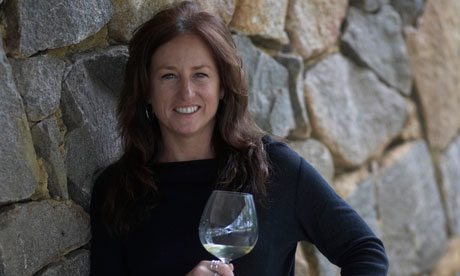
In her very funny How to Be a Woman, the journalist Caitlin Moran advocates a zero tolerance policy on "patriarchal bullshit". Her idea, like Rudy Giuliani's approach to crime in New York in the 1990s, is that if you can cut out the small, petty "crimes" (broken windows or graffiti for Giuliani; casual sexist banter and Brazilian waxes for Moran), the more serious stuff becomes easier to tackle.
Sadly, there are plenty of examples of small stuff worth sweating when it comes to the subject of women and wine. Take, for example, the still persistent tendency of some producers to describe their wines in terms of gender, where fruity rich whites are "voluptuous", while concentrated, powerful reds are "masculine". It's a way of thinking that seems particularly entrenched in France, where the official website for the wines of Beaujolais describes the Fleurie appellation as "devine [sic] countryside for feminine wines".
Whenever I hear a winemaker go on like this in a presentation, I find it hard not to laugh – it makes them come off like a Maurice Chevalier-style roué. But I can see how it might feel rather different when addressed to a woman. And the underlying message – that women are by nature either delicate, perfumed little creatures or curvy vamps while men are powerful and strong – is surely insulting to any thinking adult.
With a few exceptions, such as the widow ("Veuve") Clicquot who ran the eponymous champagne house in the 1800s, the wine industry doesn't have the greatest record. Indeed, in much of Europe it took centuries for women even to be allowed in wineries, thanks to the myth, dating back at least as far as the Romans, that a menstruating woman had the power to turn wine sour (as well as blunt steel and kill bees) by her very presence.
Virginia Wilcock, winemaker for western Australian producer Vasse Felix, says traces of this attitude could be found as late as 1999, when she took a job in Abruzzo, Italy. "There were two very old men who ran a winery I made some wine in," Wilcock says. "They were a little superstitious about women in the winery and had no desire to live up to my standards of cleanliness. They couldn't understand what I was doing there. Tricky business".
Wilcock says that was the only time in her career she felt gender was an issue. But she is fortunate to work in a country which, along with neighbouring New Zealand, has had a better record than most in the past couple of decades. Elsewhere things are slowly getting better. The evidence of my own wanderings suggests that there are many more female winemakers in senior roles than there were even five years ago.
But a scan of the lists of the names of the winemakers at recent tastings held by UK supermarkets (all of whom have exemplary records when it comes to employing women in senior wine buying positions) shows women outnumbered by 10:1. (Yet 51% of regular wine drinkers are women, according to market research company Wine Intelligence.) So true gender parity in winemaking is still a long way off. Which is worth remembering the next time you see a chardonnay described as "busty".
Six great wines from female producers
Domaines Leflaive Mâcon-Verzé, Burgundy, France 2009 (From £18.75, Corney & Barrow ; Roberson Wine) Anne-Claude Leflaive was a trailblazer in Burgundy, and remains a genuine star. This is one of her more affordable wines, and with its balance between richness and tense acidity, it is classic white Burgundy.
Filipa Pato Lokal Silex, Beiras, Portugal 2008 (£19.95, The Wine Society) Following in the footsteps of her father Luís, but by no means overshadowed by him, Filipa Pato makes sinuous, elegant reds and whites in central Portugal. A blend of the local touriga nacional and alfrocheiro, this is full of exuberant dark fruit and subtle minerality.
Yalumba Viognier, Eden Valley, Australia 2010 (£13.74, or £10.99 if you buy two bottles, Majestic) One of Australia's top winemakers, Louisa Rose has done as much as anyone in the world to popularise viognier, becoming an expert in a grape that was close to extinction not so long ago. With its aromatic peachy flavour, this is a typically sumptuous example.
Viña Leyda Loica Vineyard Pinot Noir Rosé, Leyda Valley, Chile 2008 (£9.49, Waitrose) Arguably Chile's most consistent producer, Viña Leyda's Pacific Ocean-cooled wines are made by Viviana Navarrete with a lightness of touch that comes out beautifully in this serious dry rosé, with its crunchy cranberry and raspberry flavours.
Dominio del Plata Cabernet Sauvignon, Susana Balbo, Mendoza, Argentina 2010 (£8.99, Marks & Spencer) Susana Balbo is an influential figure in Argentina, both as a director of the country's promotional body Wines of Argentina, and as a versatile, highly respected winemaker, producing bottles such as this full-bodied, cassis-and-vanilla scented red.
Tesco Finest Vinho Verde, Portugal, 2011 (£7.29, Tesco) A very graceful, delicate, low-alcohol white from northern Portugal that is full of spring-like flavours of blossom and green herbs made for Tesco by Antonina Barbosa.

